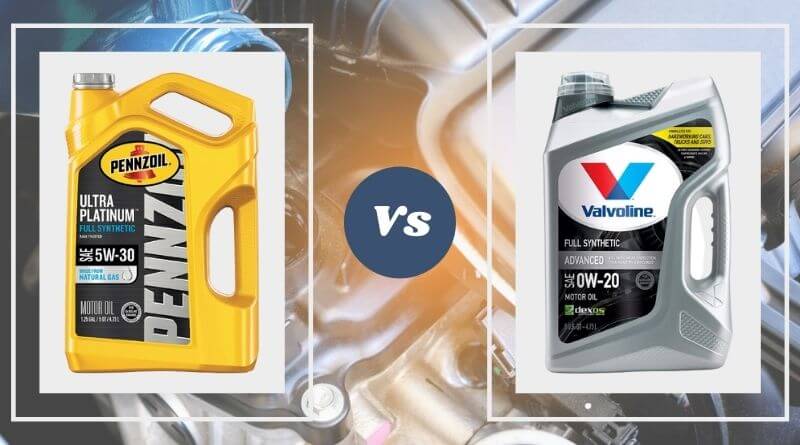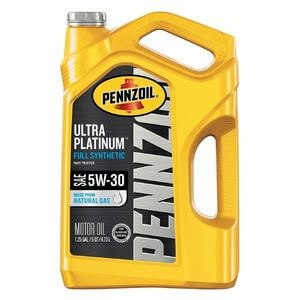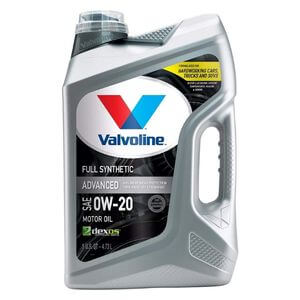Hey there! This post contains affiliate links to products. We may receive a commission for purchases made through these links. But it never influences our product selection process.
Assuming that your automobile manufacturer recommends a synthetic motor oil depending on your car model and motor. Now you find there are different brands and types of synthetic oils on the market, such as Pennzoil and Valvoline.

Now you are puzzled between Pennzoil vs Valvoline and try to estimate which offers the best quality and value for money. Luckily you came to the right place where we’ve already researched and reviewed Pennzoil vs Valvoline synthetic oil for your convenience.
Motor oil is the main food of running the engine and parts smoothly. An engine’s performance and overall safety are dependent on it. Today, Valvoline synthetic blend is well-known oil, and the company has an excellent engine lab. At the same time, Pennzoil is an American oil firm that supplies high-performance automobiles and security.
Because motor oil is widely used in various cars and engines, there is a lot of competition among motor oil companies. Let’s look at the differences between Pennzoil vs Valvoline high mileage oil to determine which is the best. You have other options to choose from besides Pennzoil vs Valvoline full synthetic oil. After doing some study, you may also choose between Schaeffer Vs Amsoil Synthetic Oil and Delvac Vs Rotella Oil from the list.
Comparison Chart of Valvoline vs Pennzoil Oil
Pennzoil Oil | Valvoline Oil |
Valvoline motor oil protects against wear and fits cars, trucks, and SUVs. | Pennzoil synthetic oil is ideal for gas engines and works on almost any vehicle, including turbocharged engines. |
Excellent heat and cold protection | Maintains capacity and flow in extreme cold and heat. |
Increases the efficiency of the vehicle's fuel system | Improves fuel economy by 550 miles annually |
Faster oil flow for cold starts | Cleaner pistons for longer |
Improved Viscosity Stability reduces high-temperature engine wear. | Shear Stability Anti-Wear Performance Characteristics |
Who Makes Pennzoil Oil
All Pennzoil motor oil sold in North America is made in the USA. Royal Dutch Shell owns the Pennzoil motor oil brand in the United States. The former Pennzoil Company was established in 1913 in Pennsylvania and operated as a separate company until Shell purchased it in 2002 and became a conglomerate brand. So Shell makes Pennzoil oil.
Pennzoil Overview
Pennzoil Platinum became the first motor oil created exclusively from natural gas after 40 years of research and development. A patented gas-to-liquid process creates base oil for Pennzoil synthetic motor oil, which is blended in the 3,500 patents the US mixing plants. Pennzoil inspects all products before distribution to assure good resistance and effectiveness.

SPECIFICATIONS:
- Oil Type: Full synthetic base;
- Engine Type: Gasoline;
- Available viscosity grades: SAE 5W-20, SAE 5W-30, SAE 10W-30, SAE 10W-40, SAE 20W-50, 30, 40;
- ILSAC :GF-6 (SAE 5W-20, SAE 5W-30, SAE 10W-30);
- API: SJ (25W-50);
- Oil change frequency: 5,000 to 7,000;Additives: Cleans pistons up to 45% better, abrasion resistance and faster low-temperature oil flow and heat protection.
Who Makes Valvoline Oil
Ashland Inc. (NYSE: ASH) is the world’s leading producer and distributor of Valvoline. It is a premium brand of automotive, corporate, and commercial lubricants. Valvoline is the lube chain, and auto oil brands in the United States rank it the second-highest.
Valvoline Overview
Valvoline is the genuine instant oil change service provider. This will benefit people who are busy with work and cannot spare time for car services. It will help revive the old engine and keep the performance satisfactory. Also, the cost of Valvoline synthetic oil change is less than other brands.

SPECIFICATIONS:
- Oil type: Synthetic blend;
- Engine type: Gasoline/Petrol/ Diesel;
- Available viscosity grades: 0W-16, 0W-20, 5W-20, 5W-30, 5W-50, 10W-30, 10W-40;
- ILSAC :GF-6;
- API: API SP;
- Oil change frequency:3,000 to 4,000;
- Additives: Premium seal conditioners, detergents, and viscosity index improvers.
Pennzoil Vs Valvoline: Oil Cost Comparison
The oil price may vary depending on the type of oil and pack size. One litre of engine oil will cost between $4 to $10. Using synthetic oil can increase the cost more than conventional oil. The price for 5 quarts of Valvoline Advanced Full Synthetic SAE 5W-30 Motor Oil is $22.47. Pennzoil Platinum Full Synthetic 5W-30 Motor Oil costs $22.93 instead.
On the other hand, in Valvoline vs Pennzoil conventional oil change intervals should be set at 3,000 to 5,000 miles to maintain the engine clean. The cost of 5 quarts of conventional oils is $35.41 for Valvoline Daily Protection SAE 10W-40 Conventional Motor Oil and $18.98 for Pennzoil – 550045214 Conventional 10W-30 Motor Oil.
Pennzoil Vs Valvoline: Differences
Both Pennzoil and Valvoline synthetic oil have a few differences.
Valvoline Advanced Full Synthetic SAE 5W-30 Motor Oil protects against wear 45% better than conventional motor oils. It fits automobiles, SUVs, and trucks. It also increases oil flow for speedier cold starts.
On the other hand, Pennzoil Ultra Platinum Full Synthetic 5W-30 Motor Oil is for gasoline engines. It works on practically any vehicle, including turbocharged ones. Also, it maintains productivity and fluidity in cold and hot conditions.
Pennzoil Vs Valvoline: Pros and Cons
Pennzoil Pros:
- Performance in any climate is guaranteed;
- Prevents and lubricates the engine;
- The fuel economy is improved;
- Enhances oil flow for more rapid cold starts
- Prolongs the life of your pistons;
- It can be reused and recycled.
Pennzoil Cons:
- The delicate cap should be managed with care;
- Not all vehicles are compatible with this oil.
Valvoline Pros:
- Protects against sludge and lacquer buildup;
- Protection in both hot and cold weather;
- Used with turbocharged engines;
- Suitable for most traditional and synthetic lubricants;
- The fuel economy has improved.
Valvoline Cons:
- Shorter periods between shifts;
- The case is of poor quality.
Engine Performance Comparison
| Engine Level | Valvoline Oil | Pennzoil Oil |
| Viscosity at 100 C | 7.91 | 9.99 |
| Cold Cranking Viscosity | 5,149 | 4,080 |
| Viscosity mass % loss | 8.9 | 9.1 |
| Phosphorus, PPM | 733 | 751 |
Customer Say About Pennzoil
Many customers claimed cleaner, more efficient engines when using Pennzoil Platinum. Most of the Pennzoil oil for gas engines protects car engines from wear and tear. It works on practically any vehicle, including turbocharged.
Customer Say About Valvoline
Buyers of Valvoline are said to be cost-efficient and effective by customers. Nowadays, users positively review using Valvoline 1830191 11271 Synpower because its range is always up-to-date. Sometimes they even compare Valvoline synpower vs Pennzoil platinum for their similar services.
Any More Questions?
Here are the most frequently asked questions concerning Pennzoil vs. Valvoline.
Is Pennzoil good oil?
True. Pennzoil Synthetic motor oils are manufactured from natural gas formulated to endure harsh conditions and keep engines clean. So it’s good oil.
Is Valvoline good oil?
Valvoline oil is an excellent lubricant that suits your engine’s needs and runs smoothly. It is heat resistant, allowing for longer drain intervals. So it is a good oil too.
Is Pennzoil conventional oil good?
Pennzoil oil is one of the most popular good conventional oils on the market to resist sludge and perform well.
Is Pennzoil Ultra Platinum a good oil?
Pennzoil Ultra Platinum is a complete synthetic high-performance oil that outperforms conventional oils in low temperature and volatility management.
How much is a synthetic oil change at Valvoline?
Three types of Valvoline full synthetic oil change are available. These are priced as follows:
1. Conventional or standard- $42;
2. High mileage or synthetic blend-$63;
3. Complete synthetic-$85.
So the Point is…
Overall, we compared the two synthetic motor oils, their features, and their sources. In addition to its well-known quality, we recommend Valvoline.
We can advise, but the final decision is yours to make. The best thing to do is to read all the reviews and information between Pennzoil vs Valvoline. Then you can compare the results. Make sure the oil you chose for your vehicle can fully protect the engine. Then determine which you like.
- Is The Jeep Cherokee Frame or Unibody (Briefly Answered) - November 10, 2022
- Are Titan Wheel Spacers Good (The 360 Guidelines) - November 9, 2022
- FCW off Jeep (Is It Important for Your Car) - November 9, 2022



